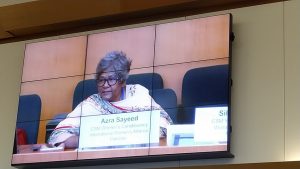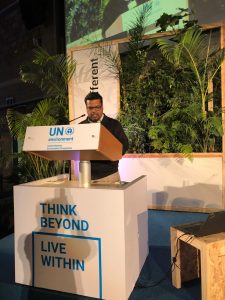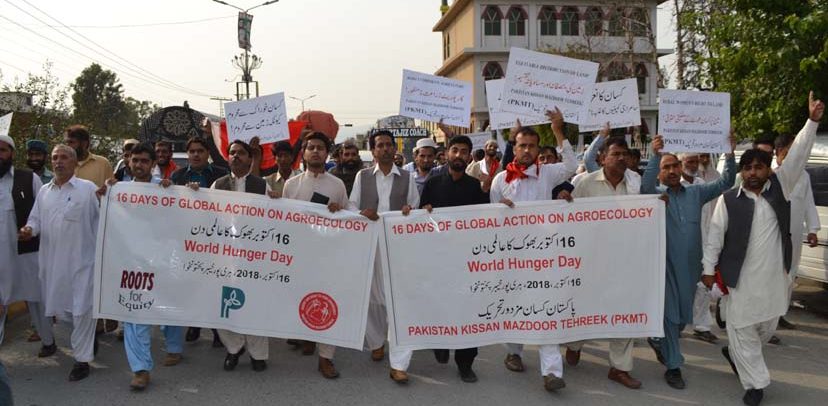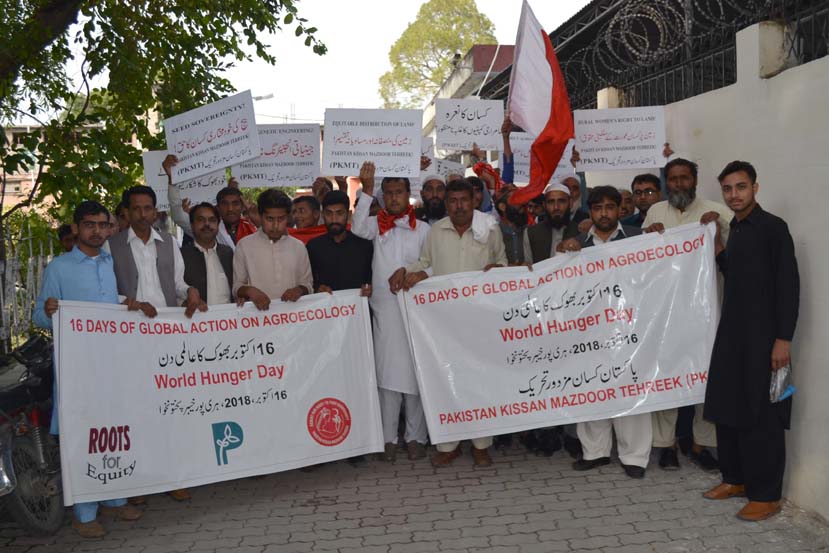Introduction:
This is a summary of an interview of Ms Maheen Zia conducted by Naveed Ahmed, Seed Sovereignty Program Coordinator from Roots for Equity. The context of the interview is on Maheen Zia’s work with Karachi Farmer’s Market-based in Karachi, Pakistan.
Ms Zia is one of the key founders of the Karachi Farmer’s Market. She is working to highlight the work of farmers and give importance to their work. She is promoting the work of farmers while sitting in the city and has the passion and ability to work for farmers. We are grateful to her that she has given her time for this interview.
Question: What attracted you to create a farmers market?
Answer: The news keeps coming that our food has become contaminated, and pesticides, fertilizers and GMOs are being used for it. We are cut off from nature and at the same time, the way disease is growing, it is in front of us too. We are six people who decided to start the farmers’ market. In all of our (six founders) families someone has been sick. It has made us realize that what we were eating makes us sick, so what could be its alternative? Personally, my father had cancer. At that point we started looking for organic flour and milled flour (chaki ka atta) and started thinking about what we were eating. Now cancer has become very common – in every household, in our close friends’ families – someone has been through this disease.
We were searching for pure food items, someone tried to find desi eggs or milks – but we wanted to have a single market where we could buy what we needed for our households. We wanted to have a system that for those who were selling here we could check what they were saying was actually being practiced and it was correct. This is why we started the market; it was started in August 2015 – it will now be five years. It is a small market but in the past five years about 30% of the people regularly buy things from here. They know that products have been checked and are of quality.
Question: Artificial agriculture or chemical agriculture produces more. So why should farmers adopt agroecology?
Answer: If your income is good by giving poison to others, then this is not correct. First of all, it is wrong in principle to produce something of low quality just because you will get production and it will be sold. This is not being said for any particular farmer but making a point in general. For example, if you have land and you want to grow something that is harmful to health for others but grow pure food elsewhere for yourself, it is wrong. In this age, this is how the world has been set up, and it may be difficult to examine it in this manner. But the way you are growing now has a short time outlook. The way you are growing now, putting pesticides and fertilizers this will degrade your land in the next ten to twenty years – what will you do then? You will not even be able to exchange this land for another piece of land? This land will not be able to grow anymore. So for your present gain you are harming your future. The harm being inflicted on others by what you are growing is an other matter but you are destroying your future, as well.
Naveed: So in the beginning you pointed out the impacts on human health and now you are pointing out that farmers must practice agroecology as (chemical agriculture) impacts land and you will face other problems.
Maheen Zia: Land will be ruined; your health will be ruined. When you use pesticide, it will first affect your family, you will be impacted as well. I believe that there is acute poverty and hence people are helpless and their hands are tied, even when they understand, they don’t have an opportunity to do something else. There is a need to help them and understand their position (majbori).
Question: What benefit you get from farmer’s market?
Answer: It makes us happy! This is an opportunity for people, there are about 300-500 people that are buying from the Farmers’ Market. There is better food getting to their households; and through this small businesses have been set up and running – so a system has been initiated. But this is small, it’s just a handful of people– Karachi in itself is a very big city. A much bigger thing that has happened is the conversation that has been started – we need to eat organically grown food, or sustainable food, we need to consume pure food. Where can we get it? Why should we have pure food? Why is it so expensive? How can we increase its production so that prices can come down? So the discussion that has been started is very important and it has the potential to increase organic production.
Question: Will small and landless farmers benefit from agro ecology?
Answer: Absolutely. They will benefit as over time, their land’s soil quality will become better, production will be better. If we can connect them to the market whatever they grow will fetch a better price, there is also a market available. There is only benefit and no harm. Whoever goes toward chemical agriculture there is only harm; you may be getting money from it at the moment but there is no barkat in this money – this is what I believe.
Naveed: If you practice agroecology you can retrieve land fertility and get an environmentally friendly ecosystem. The way the environment has been impacted, there is disease and global warming, the natural environment has been lost, using poison all of this has died and we can now regain all this through promotion of agroecology.
Question: From where did you get the seed?
Answer: If someone is coming from outside (the country) – I research on heirloom seeds – ancient seeds. Some seed banks keep these seeds and the seeds are from different area, they may not of your area but if the seed adapts to your climate than I think its okay. These seed are generally not invasive but it is very important that where you are they are suited (to that environment), they should be pest resilient; they have more nutrition. So, I search for the seed, try it out and if it starts off, then use it the next year. This is the beauty of real seed; from one seed you can get a whole field because each seed will give you plentiful. This is what nature is; in nature if you work a little hard, respect it, it will give you plentiful benefits. If you fight with nature than you will have to work hard every year, put poison every year, use chemical fertilizer and so in the end you have to work a lot and the result is still not favorable.
Question: You mentioned that you get seeds from the ancient seed bank.
Answer: There is a company in the USA called Rare Seeds. They explain the origin of the seed like I have an Iraqi plant and a Chinese beans plant. These companies provide a complete chain of information, where did this seed come from, in which year, which person cultivated it, for how many years they cultivated it, who brought this seed to us, they value the seed, and this is what their work is.
Question: Can we say that the indigenous people of those areas own these seeds?
Answer: No, because the indigenous people are in a very bad condition and they have also lost their seed, there should be an attempt to find those seeds as well; for example there is a particular bean seed Cherokee Tears. When the Cherokee people were driven out of their lands about 150 – 200 years ago, they brought seeds with them. So it’s not necessary that the indigenous people are preserving their seeds. There are some farming communities and there are some people who think like us that the real asset is your seed, it needs to be saved, especially at a time when hybrids are on the rise and GMOs are being promoted. So this is a very important work that they are doing. People are also buying from them. Small farmers buy from them and plant seeds. And then they save the seeds.
Question: Have you ever tried to get seeds from areas of Pakistan or the suburbs of Karachi?
Answer: Once I was filming in Sindh – near Badin – there was a project where they were reviving Indigo which is an ancient seed of this area and it was a plant that died out in the British era. I took the seed from there but its plant did not grow, I thought I would bring the seed again when I go back to Badin. I try that if I get a real seed I grow it. When I went to Hunza two years ago, I also brought seeds from there, but it did not grow. But maybe its climate was different, only a small sprout came out; it still is good to try things out. We need to build a network within our climate zone so that we can save the real seeds among us. Make many seed banks so that if one seed bank fails there are still other seed banks. Like once I had a beautiful sunflower seed, it had a beautiful flower; I distributed this seed to friends so it could be continued. We have a network of people who try to spread seeds in this manner. I also take seeds from the pansar. For example there is a taramera seed– these are still pure seeds – it’s a local variety; there is also kolongi, there is gaozaban but it did not germinate. I have now brought this seed from abroad and have saved seeds from it and will try it again this year. It’s a very useful plant – you can make tea from its leaves and use it for colds or flu. So this is what I do but a systematic system needs to be set up. This is a science and there are different types of seeds, some are self-seeding and you don’t need to keep them away from other plants. But other variety mix with each other for instant maize, it has to be kept a mile away from other varieties so that they do not cross-pollinate. If we are working on seed preservation, it is important to follow the procedure.
Question: Pakistani farmers are facing financial loss – how can we address this issue??
Answer: I have met only few farmers who came to the market and do not have a very good understanding of Pakistani farmers; I have met a few farmers but have not studied the issue deeply as yet and need to understand it as well. I think our economic situation is dependent on a cash economy and it drives everything. Before we used to have a barter system as well it may not have been so difficult for farmers. There are now so many barriers for farmers. Maybe I need to ask you this question why farmers are facing so many losses?
Green Revolution began under General Ayub. The whole world has been suffering the consequences of the fifty years of Green Revolution, of chemical agriculture. One third of the land is damaged which was arable and we could grow on it; if there is decreasing production and farmers are suffering losses– a big reason has to be that their land and water has been spoiled.
Question: If farmers adopt agroecology they will suffer financial loss. How can we compensate for this financial loss?
Answer: We need to think on ways forward. There needs to be a diversity of income. For example may be also including handicrafts. Also be involved in value added production so that they can have better value. All of us need basic education. It’s not a simple sum game. You will not get to know about everything from instructions on a packet. When we are growing things – it’s a natural process and we need to deepen our learning of nature, of soil. Why is soil so important, it’s not just dirt– it’s like our heart? All that we eat is based on this layer of soil. If we increase the quality of soil we will eat better. If we loose this soil then we will all face starvation. The quality of our soil is critical. We don’t understand the importance of water. These are Allah’s systems; they have been there for thousands of years. These systems were there before us and will be there after us. We are the ones who have destroyed these systems. We have used advanced technologies and believe that by using them we can make it better. But we need to go back to nature and study how systems are managed in nature.




